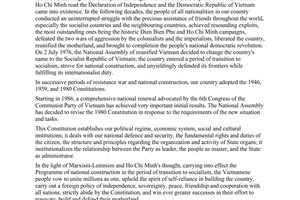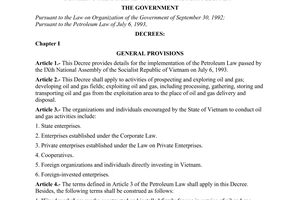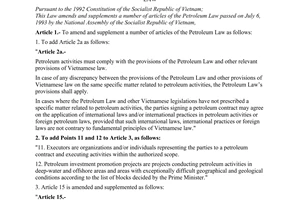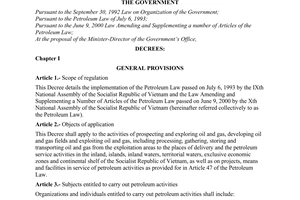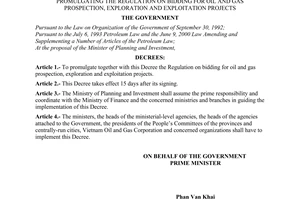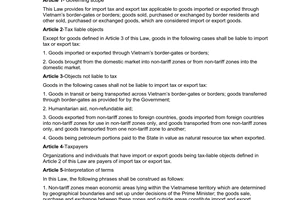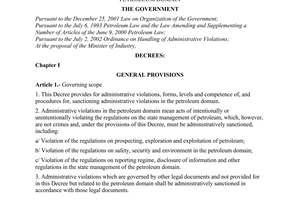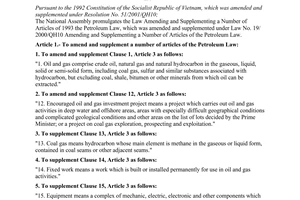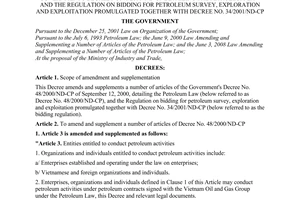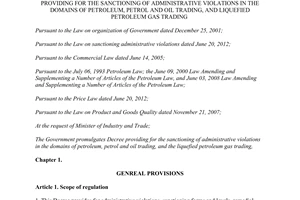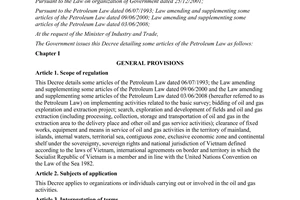Nội dung toàn văn Law No. 18-L/CTN on petroleum, passed by The National Assembly.
|
THE
STANDING COMMITTEE OF NATIONAL ASSEMBLY |
SOCIALIST
REPUBLIC OF VIET NAM |
|
No. 18-L/CTN |
Hanoi, July 6, 1993 |
LAW
ON PETROLEUM
In order to efficiently protect,
exploit and use the petroleum resources for developing the national economy,
expanding cooperation with foreign countries;
Pursuant to Articles 17, 29 and 84 of the 1992 Constitution of the Socialist
Republic of Vietnam;
This Law prescribes activities of petroleum prospection, exploration and
exploitation within the territory, exclusive economic zone and continental
shelf of the Socialist Republic of Vietnam.
Chapter I.
GENERAL PROVISIONS
Article 1.- The entire petroleum resources lying underground within the mainland, islands, inland waters, territorial waters, exclusive economic zone and continental shelf of the Socialist Republic of Vietnam belong to the entire-people ownership, and are uniformly managed by the Vietnamese State.
Article 2. The Vietnamese State encourages Vietnamese and foreign organizations and individuals to invest capital and technologies in conducting petroleum activities on the basis of respect for Vietnam’s independence, territorial integrity and national security and observance of Vietnamese law.
The Vietnamese State protects the ownership rights of Vietnamese and foreign organizations and individuals conducting petroleum activities in Vietnam over their investment capital, assets and other legitimate interests.
Article 3. In this Law, the following terms and phrases shall be construed as follows:
1. “Petroleum” means crude oil, natural gas and hydrocarbon in gaseous, liquid, solid or semi-solid form in the natural state, including sulphur and the like accompanying hydrocarbon, but excluding coal, agrillaceous rock, bitum or other minerals, from which oil can be extracted.
2. “Crude oil” means hydrocarbon in liquid form in natural status, asphalt, ozokerite and liquid hydrocarbon obtained from natural gas by method of condensation or extraction.
3. “Natural” gas means the entire hydrocarbon in gaseous form, exploited from drilling wells, including wet gas, dry gas, drilling-well head gas and remaining gas after extraction of liquid hydrocarbon from wet gas.
4. “Petroleum activities” mean activities of prospecting, exploring, developing fields of, and exploiting petroleum, including activities in direct service of these activities.
5. “Petroleum contracts” mean documents signed between Vietnam Petroleum Corporation and organizations or individuals for conducting petroleum activities.
6. “Petroleum services” mean activities related to petroleum prospection, exploration, field development and exploitation, which are conducted by subcontractors.
7. “Lot” means an area delimited with geographical coordinates and determined for petroleum prospection, exploration and exploitation.
8. “Contractors” mean Vietnamese or foreign organizations, individuals, that are permitted to conduct petroleum activities on the basis of petroleum contracts.
9. “Subcontractors” mean Vietnamese or foreign organizations, individuals, that sign contracts with contractors or petroleum joint-venture enterprises for provision of petroleum services.
10. “Petroleum joint-venture enterprises” mean joint-venture enterprises set up on the basis of petroleum contracts or on the basis of agreements signed between the Vietnamese Government and foreign governments.
Chapter II.
PETROLEUM ACTIVITIES
Article 4. Organizations and individuals conducting petroleum activities must employ advance techniques and technologies and comply with Vietnamese laws on natural- resource protection, environmental protection and safety for humans and property.
Article 5. Organizations and individuals conducting petroleum activities draw up schemes for environmental protection, apply all measures to prevent pollution, get rid of all polluting causes and have to address the consequences caused by environmental pollution incidents.
Article 6. Organizations and individuals conducting petroleum activities must establish safety zones for works in service of petroleum activities as provided for by the Vietnamese Government.
Article 7. Organizations and individuals conducting petroleum activities must buy insurance for means and facilities in service of petroleum activities, environmental insurance and other insurances as provided for by Vietnamese law, in accordance with international practices in petroleum industry.
Article 8. The prospection and exploration area for a petroleum contract shall be determined on the basis of lots delimited by the Vietnamese Government.
Article 9. Petroleum activities must not be conducted in zones banned or temporarily banned by the Vietnamese State for reasons of national defense, security or public interests.
Where petroleum activities have been licensed but are banned or temporarily banned, the Vietnamese Government shall satisfactorily settle damage caused to organizations and/or individuals by such bans or temporary bans.
Article 10. The Vietnamese Government permits organizations and/or individuals to conduct activities of scientific research, prospecting, exploring and exploiting minerals and other natural resources than petroleum within the areas covered by petroleum contracts according to Vietnamese law. These activities must not obstruct and cause harms to petroleum activities.
Article 11. All specimen, data and information gathered in the process of conducting petroleum activities belong to the Vietnamese State’s ownership. The management and use of < span="">, data and information must comply with the provisions of Vietnamese laws.
Article 12. Organizations and individuals conducting petroleum activities are allowed to install, operate and maintain fixed works and equipment in service of petroleum activities; are allowed to construct and use traffic ways, pipe lines, depots in service of petroleum transportation and storage according to the provisions of Vietnamese laws.
The above-said fixed works and equipment shall belong to the Vietnamese State’s ownership from the time agreed upon by parties to petroleum contracts.
Article 13. Upon the termination of petroleum activities, organizations and individuals must free the used areas and dismantle fixed works and equipment at the requests of competent State management agencies.
Article 14. Vietnam Petroleum Corporation (with its international transaction name being “PETROVIETNAM”) is a State enterprise set up by the Vietnamese Government to conduct petroleum activities and sign petroleum contracts with organizations or individuals conducting petroleum activities according to the provisions of this Law.
Chapter III.
PETROLEUM CONTRACTS
Article 15. Petroleum contracts shall be signed in form of production-sharing contract, joint-venture contract or other forms.
The petroleum contracts must comply with the model contract promulgated by the Vietnamese Government, comprising the following principal contents:
1. The legal status of organizations, individuals participating in the contracts;
2. The contractual objects;
3. The area limits and schedule for return of contractual areas;
4. The contractual term;
5. Conditions for termination of contracts ahead of time or for prolongation of contractual term;
6. Commitments on work schedules and financial investment;
7. Rights and obligations of the contractual parties;
8. The recovery of investment capital, the profit determination and division; the host country’s rights over fixed assets upon capital reimbursement and contract termination;
9. Conditions for transfer of rights and obligations of contractual parties; Vietnam Petroleum Corporation’s right to contribute investment capital;
10. Commitment to training and prioritized use of Vietnamese labor and services;
11. Responsibility to protect environment and ensure safety while conducting petroleum activities;
12. Procedures for settlement of disputes arising from contracts.
Apart from the provisions in the model contract, the contractual parties may agree on other terms, which are not contrary to this Law and Vietnamese legislation.
Article 16. Organizations and individuals wishing to sign petroleum contracts must go through biddings or other forms prescribed by the Vietnamese Government. They must clearly explain their financial capabilities, technical levels and professional experiences in petroleum activities.
Article 17. The term of a petroleum contract shall not exceed twenty five (25) years, of which the prospection and exploration duration shall not exceed five (5) years.
The term of petroleum contracts for deep-water, offshore areas and the term of contracts on natural gas prospection, exploration and exploitation shall not exceed thirty (30) years, of which the prospection and exploration duration shall not exceed seven (7) years.
The terms of petroleum contracts may be prolonged but for not more than five (5) years and the propection and exploration duration may be prolonged but for not more than one (1) year, at the requests of contractors and the prolongation must be decided by the Vietnamese Government.
Petroleum contracts may terminate ahead of time provided that the contractors must fulfill all committed obligations and such termination must be agreed upon by the contractual parties.
Article 18. The prospection and exploration area for a petroleum contract shall not exceed 2 lots (two lots)
In special cases, the Vietnamese Government may permit the prospection and exploration area of more than 2 lots (two lots) for a petroleum contract, which, however, must not exceed < span="">
Article 19. Contractors must return the prospection and exploration areas according to regulations of the Vietnamese Government.
Article 20. Contractors and Vietnam Petroleum Corporation must agree in the petroleum contracts on the work schedules and commitments to minimum financial investment in the prospection and exploration period.
Article 21. Immediately after the discovery of petroleum, contractors and Vietnam Petroleum Corporation must report and provide all necessary information on the discovery of petroleum to competent State management agencies.
If deeming that the discovered petroleum is of commercial value, the contractors must immediately realize the program for reserve appraisal, make reports on deposits, field development and exploitation charts and submit them to the competent State management agencies for approval.
Article 22. The languages used for petroleum contracts signed with foreign organizations or individuals and the documents enclosed with the contracts must be the Vietnamese and a common foreign language agreed upon by Vietnam Petroleum Corporation and such foreign organizations or individuals. The Vietnamese-language and the foreign-language copies shall have the equal value.
Article 23. Petroleum contracts shall take effect after they are approved by the Vietnamese Government.
Article 24. The partial or full transfers of petroleum contracts by contractual parties shall take effect only after they are approved by the Vietnamese Government.
Vietnam Petroleum Corporation shall have the priority right to repurchase the partially or fully transferred contracts.
Article 25. Vietnam Petroleum Corporation may contribute capital to petroleum contracts. The percentage and time for capital contribution, the reimbursement of expenses for contractors and the agreement on administration shall be prescribed in the petroleum contracts in accordance with international practices in the petroleum industry.
Article 26. The contractors may sign petroleum service contracts but must prioritize the signing of such contracts with Vietnamese organizations or individuals.
Vietnam may undertake flight services by itself or sign joint-venture contracts with foreign countries for the provision of flight services in service of petroleum activities.
Article 27. Disputes arising from petroleum contracts must be settled first of all through negotiations and conciliation.
In cases where the disputing parties cannot reconcile with one another, their disputes shall be settled under the provisions of Vietnamese laws if the disputing parties are Vietnamese organizations and/or individuals; or under the provisions of the Law on Foreign Investment in Vietnam if they are foreign organizations and/or individuals.
Chapter IV.
RIGHTS AND OBLIGATIONS OF CONTRACTORS
Article 28. The contractors shall have the following rights:
1. To enjoy preferences and guarantees as provided for by Vietnamese law;
2. To use gathered specimen, data and information for petroleum activities;
3. To recruit laborers for performance of jobs under petroleum contracts on the basis of prioritizing the recruitment of Vietnamese laborers;
4. To hire subcontractors in accordance with the provisions of this Law and international practices in the petroleum industry;
5. To be exempt from import tax on equipment and supplies necessary for petroleum activities and be exempt from re-export tax when the imported equipment are not installed at fixed places or when the supplies are not used up according to the provisions of Vietnamese laws;
6. To own their petroleum shares after fulfilling the financial obligations towards the Vietnamese State;
7. To export their petroleum shares as agreed upon in the petroleum contracts.
8. To recover investment capital as agreed upon in the petroleum contracts;
9. The contractors being foreign organizations and individuals may transfer their investment capital and profits earned in the process of petroleum activities abroad according to the provisions of the Law on Foreign Investment in Vietnam.
Article 29. The subcontractors are entitled to enjoy the rights prescribed at Points 1, 3 and 5, Article 28 of this Law.
The subcontractors being foreign organizations and individuals may also enjoy the rights prescribed at Point 9, Article 28 of this Law.
Article 30. The contractors shall have the following obligations:
1. To comply with the Vietnamese law;
2. To fulfill the commitments inscribed in the petroleum contracts;
3. To pay assorted taxes, fees according to the provisions of Vietnamese laws;
4. To transfer technologies, to train, employ Vietnamese cadres and workers and ensure the laborers’ interests;
5. To apply measures for environmental protection;
6. To report on their petroleum activities to competent State management bodies and Vietnam Petroleum Corporation;
7. To supply documents for inspection teams;
8. To clear the works and remove equipment and means upon termination of petroleum activities at the requests of competent State management agencies;
9. To sell on the Vietnamese market part of the petroleum under their respective ownership when so requested by the Vietnamese Government.
Article 31. The subcontractors shall have the obligations prescribed at Points 1, 2, 3, 4, 5 and 7, Article 30 of this Law.
Chapter V.
TAXES AND FEES
Article 32. Petroleum-exploiting organizations and individuals must pay natural resource tax.
The natural resource tax shall be calculated on the actually exploited output in the tax payment period for each petroleum contract.
The natural resource tax rates prescribed for crude oil shall range from six percent (6%) to twenty five percent (25%) or higher in special cases.
The natural resource tax rates prescribed for natural gas shall range from zero percent (0%) to ten percent (10%).
The Vietnamese Government shall prescribe the specific tax rates within the above-mentioned tax rate brackets, depending on the geographical, economic and technical conditions of oil fields and crude oil or natural gas output.
Article 33. Organizations and individuals conducting oil and gas prospection, exploration and exploitation must pay income tax at the rate of fifty percent (50%) on the taxable income in the tax payment period.
In special cases, organizations and individuals conducting activities of petroleum prospection, exploration and exploitation may enjoy income tax exemption or reduction. The income tax exemption or reduction shall be provided for by the Vietnamese Government.
Article 34. The subcontractors being Vietnamese organizations or individuals, that conduct activities in Vietnam must pay income tax according to the provisions of the Profits Tax Law.
The subcontractors being foreign organizations or individuals and registering their operations in Vietnam shall have to pay income tax according to the provisions of the Law on Foreign Investment in Vietnam.
The subcontractors being foreign organizations or individuals that fail to register their operations in Vietnam shall have to pay tax according to the provisions of Vietnamese laws.
Article 35. Organizations and individuals conducting petroleum activities must pay export tax, import tax, land surface rentals or land and house tax, other taxes and fees according to the provisions of Vietnamese law.
Foreign organizations and individuals conducting petroleum activities shall have to pay tax on transfer of profits overseas according to the provisions of the Law on Foreign Investment in Vietnam.
Article 36. Foreigners and Vietnamese working for contractors, oil and gas joint-venture enterprises or subcontractors must pay income tax according to the provisions of Vietnamese laws.
Article 37. Under the agreements in petroleum contracts, the natural resource tax and taxes to be paid by contractors or petroleum joint-venture enterprises can be aggregated into the portion of shared products of Vietnam Petroleum Corporation provided that Vietnam Petroleum Corporation commits to pay the natural resource tax and such taxes for the contractors or the petroleum joint-venture enterprises.
Chapter VI.
STATE MANAGEMENT OVER PETROLEUM ACTIVITIES
Article 38. The State management over petroleum activities shall cover the following contents:
1. Deciding on strategies, plannings, plans and policies for development of the petroleum industry;
2. Promulgating normative documents on management of petroleum activities;
3. Examining, inspecting and supervising petroleum activities;
4. Deciding on delimitation and adjustment of lots or areas for petroleum prospection, exploration and exploitation;
5. Deciding on undertakings and forms of cooperation with foreign countries;
6. Approving petroleum contracts;
7. Deciding on policies to promote or limit petroleum export in order to ensure the State’s interests, taking into account the contractors’ interests;
8. Directing, guiding and examining branches and localities in their activities related to petroleum activities;
9. Settling matters related to the rights to conduct petroleum activities, handle violations of this Law.
Article 39. The Vietnamese Government shall perform the uniform State management over petroleum activities.
The petroleum-State management agencies shall be set up under the Law on Organization of the Government to perform the function of State management over petroleum activities.
The ministries and other State agencies shall perform the function of State management over petroleum activities according to their respective tasks and powers.
Chapter VII.
INSPECTION OF PETROLEUM ACTIVITIES
Article 40. The inspection of petroleum activities is the specialized inspection aiming to ensure the observance of provisions of this Law, rules, technical process and regulations, to protect petroleum resources, protect environment, to ensure technical safety and the fulfillment of obligations towards the Vietnamese State by organizations and individuals conducting petroleum activities.
Article 41. The petroleum-State management agencies shall organize the performance of function of inspecting petroleum activities.
When conducting inspection of petroleum activities, the inspection teams shall have the powers:
1. To request relevant organizations and individuals to supply documents and give answers on matters necessary for the inspection;
2. To apply measures of technical examination on the field;
3. To suspend or propose competent State agencies to suspend petroleum activities threatening to cause accidents or serious loss of human lives, property or petroleum resources and environmental pollution;
4. To handle according to competence or propose competent State agencies to handle violations.
Article 42. Organizations and individuals conducting petroleum activities must create favorable conditions for inspection teams to perform their tasks and must strictly abide by all decisions of the inspection teams.
Organizations and individuals are entitled to complain about decisions of the inspection teams according to the provisions of Vietnamese laws.
Chapter VIII.
HANDLING OF VIOLATIONS
Article 43. Organizations and individuals violating the provisions of this Law shall, depending on the seriousness of their violations, be subject to caution, fines, confiscation of means or to the application of other administratively sanctioning forms and measures.
Violating individuals who commit criminal acts shall be examined for penal liability according to the provisions of Vietnamese law.
Article 44. Organizations and individuals conducting petroleum activities, if causing damage to petroleum resources or other natural resources, environment or properties of the State, organizations and/or individuals, shall have to pay compensations therefor according to the provisions of Vietnamese laws.
Article 45. Organizations and individuals that illegally obstruct petroleum activities shall be handled for their violations according to the provisions of Vietnamese laws.
Article 46. Organizations and individuals are entitled to complain about violation-handling decisions according to the provisions of Vietnamese laws.
Chapter IX.
IMPLEMENTATION PROVISIONS
Article 47. This Law and other law provisions of Vietnam shall also apply to:
1. Works, means, equipment in service of petroleum activities in the exclusive economic zone and continental shelf of the Socialist Republic of Vietnam;
2. Works, means and equipment of Vietnamese organizations and/or individuals in service of petroleum activities on the basis of cooperation with foreign countries in regions falling beyond the jurisdiction of the Socialist Republic of Vietnam.
Article 48. The Vietnamese Government ensures the economic benefits of the parties to signed petroleum agreements, contracts, already approved by the Vietnamese Government before the effective date of this Law.
Article 49. Basing itself on the provisions of this Law, the Vietnamese Government shall sign with foreign Governments the agreements on cooperation in conducting petroleum activities in Vietnam.
Article 50. The previous provisions contrary to this Law are hereby all annulled.
The Vietnamese Government shall detail the implementation of this Law.
Article 51. This Law takes effect as from September 1, 1993.
This Law was passed on July 6, 1993 by the IXth National Assembly of the Socialist Republic of Vietnam, at its Third Session./.
|
|
NATIONAL ASSEMBLY |
